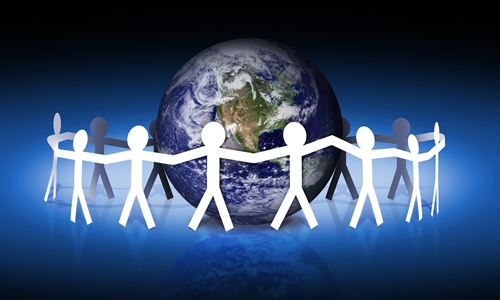HOME >> OPINION
World must build strong solidarity for fighting pandemic: Global Times editorial
Source:Global Times Published: 2020/3/27 11:48:40

Photo: IC
The G20 special summit was held, reflecting the actual desire of countries to cooperate in fighting the pandemic. The summit reached some agreements, bringing hope to the international community.
The spreading outbreak of novel coronavirus has severely impacted many of the daily functions of the international system. The global transport system is basically paralyzed, and even organizations like the European Union are in unprecedented chaos. Borders between member states have once again prevented the movement of people, and interception of medical supplies has continued to occur.
The biggest human weakness exposed to the pandemic, which has not yet reached its climax, is the lack of the capacity for unity and coordinated action. There are already many organizations in the world, and global links such as trade, finance and information are well developed. But none of this has produced the real solidarity needed to fight a crisis like a pandemic, and the international system is riddled with fragility.
The fundamental reason why China was able to effectively contain the epidemic in a short time is that the country has a high degree of coordination and unified action. The virus was able to spread around the world because the international system had no unified strategy to fight it. Even in Europe and the West, collaboration between different countries is weak with each country fighting on its own. The lines of defense that each has built cannot be connected to a Great Wall against the virus.
It is conceivable that most of the most dangerous challenges of the future will come from the nature after humans have accumulated a basic culture of co-existence. Since the beginning of the new century, we have experienced devastating natural disasters such as earthquakes, tsunamis and hurricanes. This time, it was hit by novel coronavirus completely beyond imagination, which almost brought shock to the major economic activities of mankind. However, the total global expenditure on preventing natural disasters is far less than the total military expenditure of each country.
The US attacks on China have not stopped during the epidemic, reflecting the strong inertia of geopolitical thinking. The world is still essentially geopolitical in nature, and American political thinking is fully subordinate to this logic, affecting the basic direction of international politics. Getting out of this bondage requires a tremendous effort from the international community.
The world is now more difficult because it is broken, and the reality of the crisis is making many people feel that way. Although there are few practical levers to push for unity, the convening of the special G20 summit shows that most countries are unwilling to give up hope. No matter how far it pushes the world toward unity, everyone is willing to try.
The unity of the world first means the unity of the great powers. When great powers compete with each other, human solidarity is empty talk. Whether the top power is truly committed to promoting the continuous strengthening of international cooperation is of more decisive significance. Therefore, it must be said that the US is primarily responsible for the world's ability to cooperate far less than the human need to fight the epidemic.
Since the beginning of this century, most of the crises encountered in the US were non-geopolitical, and the real political shock has only been 9/11 attacks once. Whether Hurricane Katrina, the financial crisis of 2008, or the novel coronavirus pandemic, they are irrelevant to what the US National Security team and intelligence agencies have imagined. America's vision of danger is at odds with its reality.
It is never too late to mend. Human beings need to step up to build the ability to meet common challenges. This unprecedented global public health crisis should be an opportunity for us to recognize the urgency and take practical steps to build this capacity. So many people can't die in vain, so many companies can't go bankrupt for nothing. The world needs to learn from each failure. Mankind needs to see where we stand, what the risks are, and we must act.
Posted in: EDITORIAL